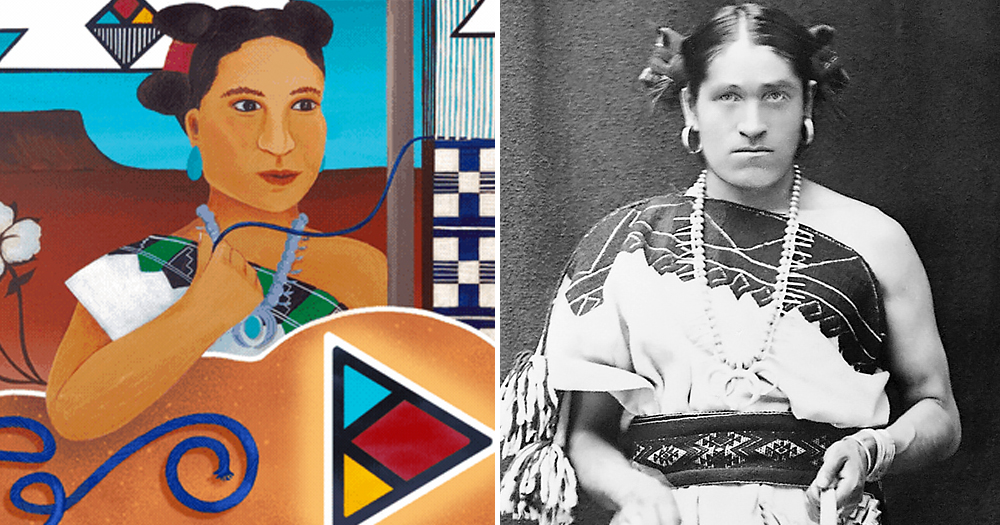November is Native American Heritage Month, and to celebrate, Mallery Quetawki has illustrated a Google Doodle of the late We:wa. They are referred to as “the late We:wa,” with advising by the Zuni tribe, to respect the tradition of speaking about community members who have passed on in the past tense.
Living outside of the male-female binary, the late We:wa was born a male around 1849 in Zuni Pueblo, a community indigenous to the land now known as the North-West corner of New Mexico. Historically, the late We:wa has been referred to as both “he” and “she”. The Zuni tribe, or A:shiwi in the native language, uses the term Lamana, or of a third gender existing outside the gender binary, to define the late We:wa’s gender. According to Google, “the term ‘Two Spirit’ was adopted in the 1990s to encompass the various non-binary gender identities and expressions amongst Indigenous peoples.” Lamanas were traditionally highly regarded within the Zuni community because of their dual role in society that reflects harmony and balance.
The late We:wa, a spiritual leader of the community, was known for their leading role in better informing the government of the United States on the culture of the Zuni people and the importance of protecting their lands. Travelling to Washington D.C. in 1885 with two anthropologists, the late We:wa called upon high-ranking U.S. officials to protect Zuni lands from more colonists.
Mallery Quetawki, born and raised in Zuni, New Mexico, is an artisan of both traditional and non-traditional Zuni art. Her artwork includes pottery, sash belt weaving, drawing, painting, and more.
Quetawki invites the viewer to learn the story of the late We:wa by weaving within the Google Doodle. The intertwining of different strands of colours symbolizes the unification of the Zuni community.
From interacting with the Doodle, she says, “I hope that people become aware of our traditional customs and the fact that they are very much in practice currently…We:wa was a male individual who lived as a woman. He is an ancestor of ours whom we think so dearly. If we could all be caring and empathetic to one another we can all live We:wa’s legacy.”
The Doodle seeks to inform people on the versatile life of the late We:wa during Native American heritage month, while drawing attention to their skills in creating revered crafts of the tribe. Like other Lamanas of the Zuni people, the late We:wa was taught a variety of skills done by both men and women.
Though understood as a traditionally male role, the late We:wa was known for their talent in weaving ceremonial belts for men and traditional dresses for women. Typically done by Zuni women, the late We:wa also created pottery. One of the first Zuni craftspeople to sell ceramics and woven goods to non-Indigenous people, the late We:wa’s talent influenced the evolution of these Indigenous crafts being appreciated and purchased throughout the United States and beyond.
Actively preserving the history of marginalized and underrepresented groups is crucial to establishing a more equal society. Native American Heritage month is a designated time to platform Indigenous voices and art, and this Google Doodle is one example that signifies the importance of doing this all year long, not just in November.
The late We:wa was an inspiring leader whose gender fluidity was respected and given the space to flourish within the Zuni tribe. This beautiful story of a Lamana is so very relevant to the progress of gender in our world today, and Quetawki’s interactive artwork honours Zuni history while contributing to an ongoing discussion of acceptance.
© 2021 GCN (Gay Community News). All rights reserved.
Support GCN
GCN is a free, vital resource for Ireland’s LGBTQ+ community since 1988.
GCN is a trading name of National LGBT Federation CLG, a registered charity - Charity Number: 20034580.
GCN relies on the generous support of the community and allies to sustain the crucial work that we do. Producing GCN is costly, and, in an industry which has been hugely impacted by rising costs, we need your support to help sustain and grow this vital resource.
Supporting GCN for as little as €1.99 per month will help us continue our work as Ireland’s free, independent LGBTQ+ media.
